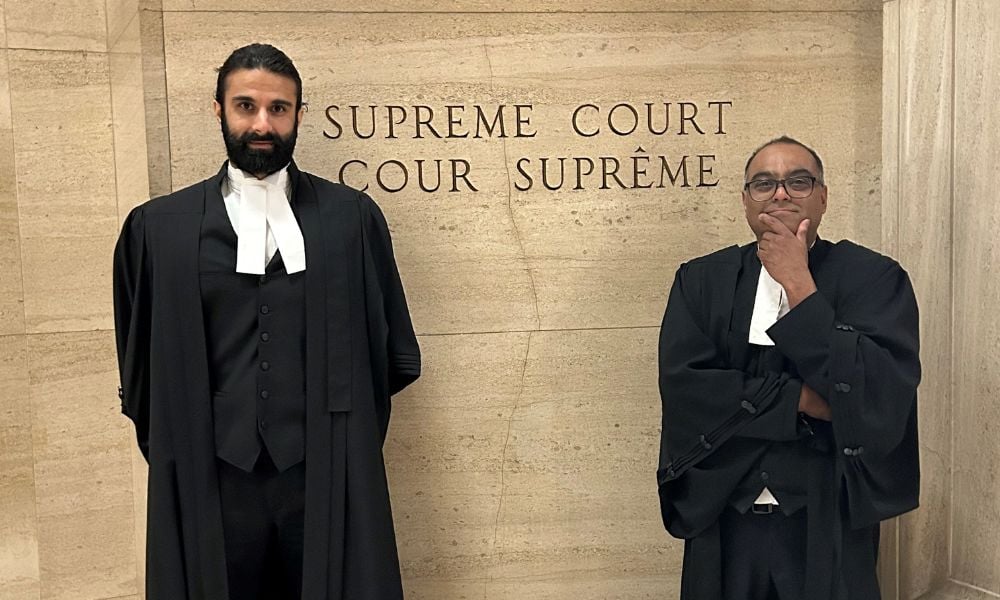Decision ensures defence 'will not be unfairly punished for reasonable unavailability,' says lawyer

The Supreme Court of Canada has ruled on the acceptable delay in trials where a portion of the delay occurred before R. v. Jordan and the appropriate allocation of delay when the defence rejects a hearing date.
The SCC released its reasons in R. v. Hanan, 2023 SCC 12 on Friday morning but made its decision from the bench on April 17. The court found the 35-month delay in the trial of Dia ‘Eddin Hanan violated his right to be tried within a reasonable time under s. 11(b) of the Charter. The five-judge panel unanimously allowed his appeal, set aside his convictions, and entered a stay of proceedings.
The court rejected the Crown’s position that all the time between the defence’s rejection of a hearing date and the next available hearing date is attributable to the defence. The court found that this proposed “bright line rule” is inconsistent with the characterization of defence delay in Jordan: “delays caused solely or directly by the defence’s conduct or delays waived by the defence.”
The decision is “a reiteration of how s. 11(b) applications should be approached by trial judges and appellate courts when dealing with transitional cases,” says Saman Wickramasinghe, who represented Hanan at the SCC with co-counsel Parmbir Gill.
On the portion of the delay attributable to the defence, the SCC cited its ruling in R. v. Boulanger, 2022 SCC 2, in finding that “all relevant circumstances should be considered to determine how delay should be apportioned among the participants.”
“They said that you've got to take a highly contextual approach and consider all the factors and come up with a fair distribution of delay in those circumstances,” says Wickramasinghe.
“The decision ensures that defence counsel will not be unfairly punished for reasonable unavailability,” says Gill. Wickramasinghe and Gill are litigators at Ursel Phillips Fellows Hopkinson LLP in Toronto.
An Ontario court convicted Hanan of manslaughter, discharging a firearm with intent to wound, and possessing a loaded restricted firearm without a licence. Though he was charged in December 2015, his trial did not occur until October 2019.
The trial was initially set for a year earlier, but an unexpected change to the Crown’s case caused a delay. Hana offered to proceed by judge alone rather than before a jury, but the Crown refused. There was a further delay of a few months because of the unavailability of defence counsel.
Hanan applied for a stay of proceedings, arguing that the delay was unreasonable according to R. v. Jordan, 2016 SCC 27. Under s. 11(b) of the Charter, an accused has a right to be tried within a reasonable time. Jordan set a ceiling for that reasonable time at 18 months for provincial court trials and 30 months for trials in Superior Courts.
Part of Hanan’s trial delay occurred before the SCC released its decision in Jordan in 2016.
Hanan’s delay, minus the time attributable to the defence, was 35 months. But the trial judge denied the stay, finding that the parties had reasonably relied on pre-Jordan law and the “transitional exceptional circumstance” applied.
The court convicted Hanan of manslaughter and the firearms offences but acquitted of the other charges. He appealed to the Court of Appeal, arguing that the trial judge had erred in dismissing his s. 11(b) application. In a split ruling, the court dismissed the appeal, confirming that the delay was justified by the transitional exceptional circumstance.
The dissenting judge would have found that the trial judge had erred in the finding that the transitional exceptional circumstance justified the delay and in his instructions to the jury.
When an appeal court is split on a question of law, the losing party has the right to appeal to the SCC. The case was heard and decided by a five-judge panel of Justices Côté, Malcolm Rowe, Sheilah Martin, Nicholas Kasirer, and Mahmud Jamal.
The court found the 35-month net delay was unreasonable and a breach of s. 11(b), and no transitional exceptional circumstance applied in the case. The trial judge found that the parties had relied on pre-Jordan law, but they “consciously scheduled a trial within the Jordan ceiling,” said Côté and Rowe, who wrote the reasons. The trial judge should have focused on whether the parties and the courts had sufficient time to adapt to Jordan, and the delay did not arise because they lacked sufficient time but because the Crown refused to agree to a trial by judge alone, they said.
The SCC also disputed the amount of the delay the judge attributed to the defence. “There is no bright‑line rule according to which all of the delay until the next available date following defence counsel’s rejection of a date offered by the court must be characterized as defence delay,” said Côté and Rowe. “All relevant circumstances should be considered to determine how delay should be apportioned among participants.”









